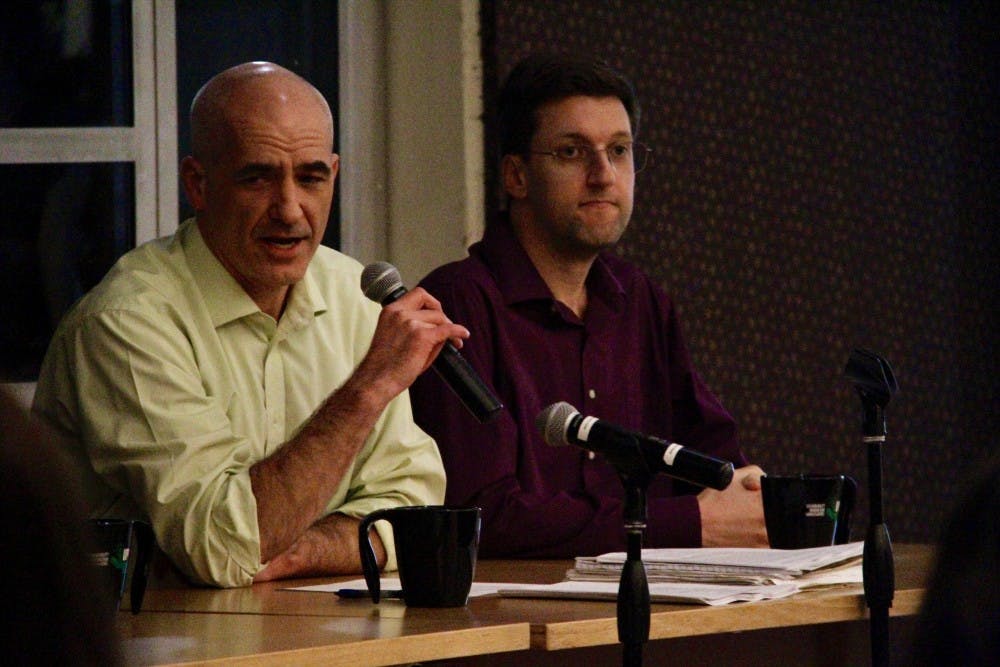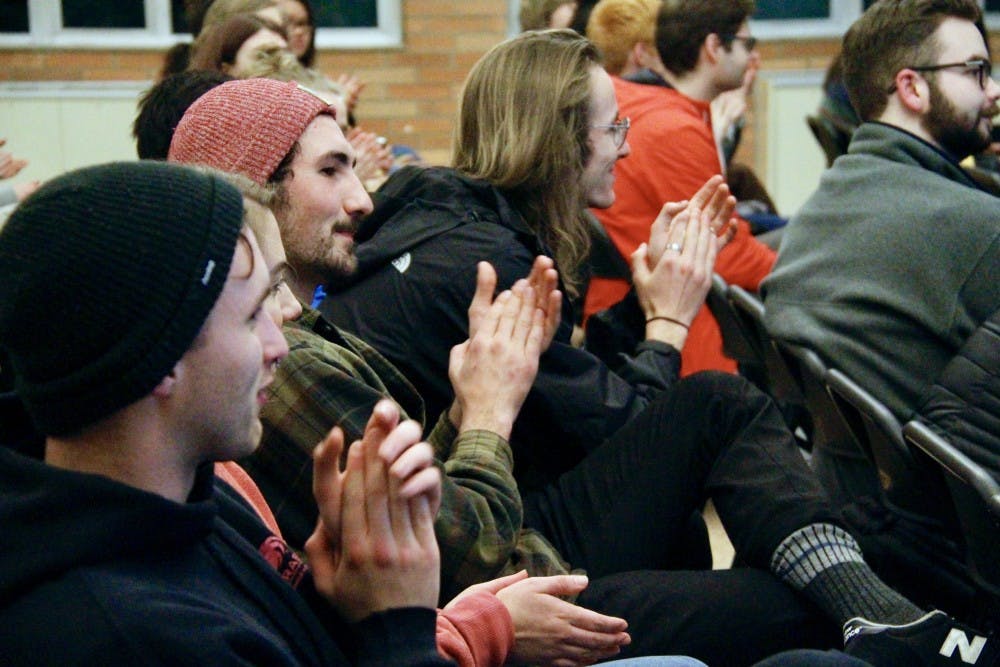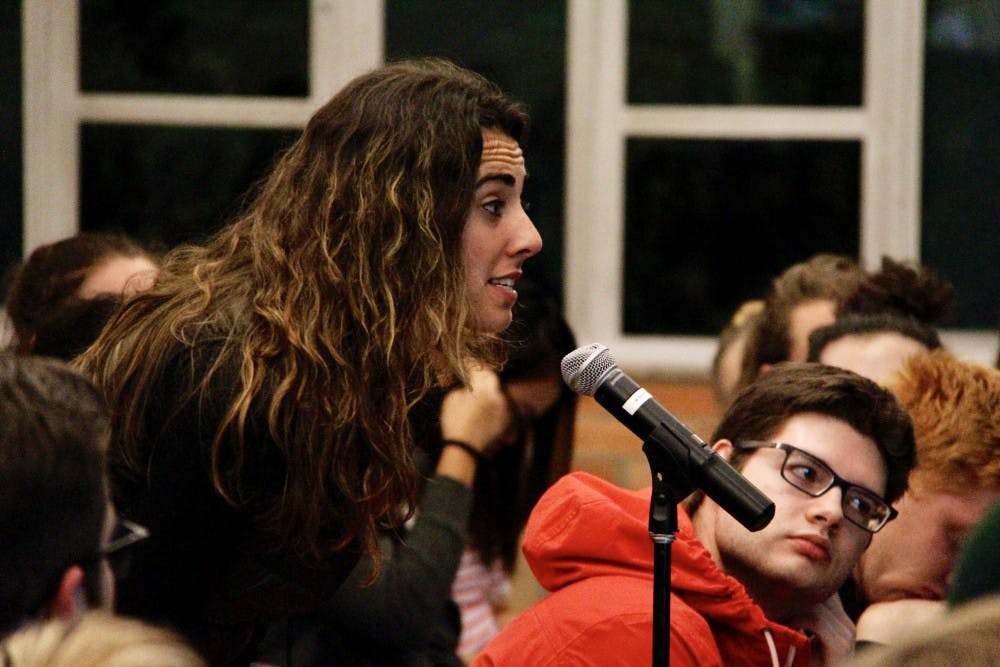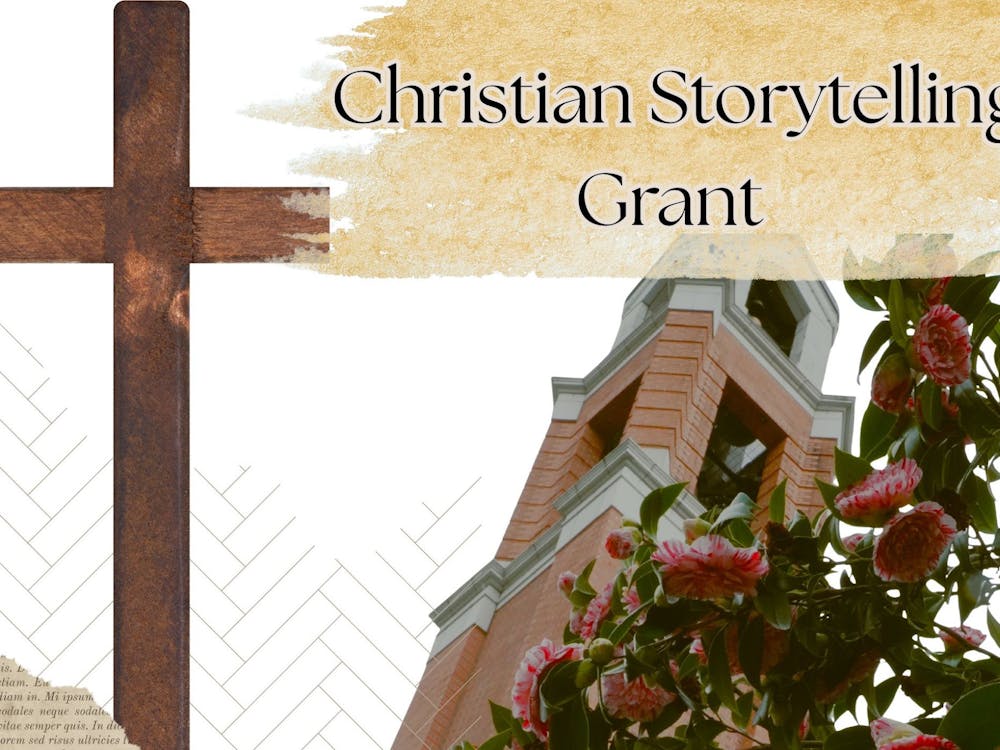Students gathered in the Mehling Ballroom Thursday night for a presentation and passionate discussion about sustainability at the University of Portland.
Panelists involved in sustainability efforts on campus helped guide the presentation and student question and answer session. The panel was comprised of Environmental Science Professors Steve Kolmes, Ted Eckmann and Bill Barnes, General Manager of Bon Appetit Kirk Mustain, and junior Theresa Valdez, dorm composting coordinator.
The event, which was hosted by ASUP and the College Ecology Club, covered UP’s past, present and future in regards to sustainability, and drew a crowd of about 80.
Barnes, who teaches economics and environmental science classes, shared some thoughts on what the sustainability movement on campus means to him.
“This is really exciting for me to see. I think it’s important for students to engage in this issue,” Barnes said. “Climate change really is the issue of the century and it is not going to go away.”
The panel addressed some ways the university is already achieving its sustainability goals.
“One of the really interesting things about UP is it hardly advertises one of the major things it does which is sustainable buildings on campus,” Kolmes said.
The LEED certification is a measure of how efficient a building is. On campus, there is one LEED platinum building, two gold, and two silver, according to Kolmes. Kolmes also noted that Shiley Hall is one of fifteen campus buildings in the U.S. to achieve platinum certification, the highest possible.
While the panel spoke primarily about what the university is already doing, one student asked the panelists how UP could improve sustainability on campus. Kolmes and Eckmann focused on student involvement.
“I’d like to see students represented more in decisions made by the university,” Eckmann said.

Some students have already gotten involved in improving the university’s carbon footprint. Valdez said that over the past year, the dorm composting program has grown to be everything she could’ve hoped for. The program has collected over 2,000 pounds of food waste since its inception a year ago, she said. The program also employs three students as compost riders who pick up the compost each week.
“To be able to divert a ton of food waste from landfills has been great,” Valdez said. “Seeing the progress each semester is really encouraging, and it’s becoming a cultural norm. Once it’s become a cultural norm, you’ve basically set in motion a new thing.”
Another focal point of the discussion was the possibility of a full-time sustainability coordinator position at the university. The position would entail the responsibilities of teaching, partnership, support, leadership, assistance, consultation and to apply for grants.There was a petition at the event in favor of hiring a full-time sustainability coordinator.
“You want to have a sustainability coordinator who is really good across boundaries and reaching out around the school,” Barnes said. “You don’t want siloing, you want someone getting it embedded in the DNA of the institution.”
The University tried implementing a sustainability coordinator in the past, but it didn’t quite work out, according to Barnes.
“We tried for a full time position, some years ago, but ended up with a half time position,” Barnes said. “I would say when we did have those part time positions things were flowing better. I personally feel that we need a full time position.”

Mustain also addressed what Bon Appetit has been doing in terms of sustainability. He said company’s biggest step was last year’s introduction of ecotainers. Mustain said he is pleased that there appears to have been a shift of culture on campus and that being more sustainable has become the norm.
“The results have been astounding for us. It took about a month for this to get rolling, but we have reduced the amount of boxes from 3,000 to 1,000 per day,” Mustain said. “We found that we needed to make the ecotainers easy to use, low cost, and we needed to incentivise it.”
Mustain estimated that the ecotainers have saved about 280,000 to-go boxes since the start of the 2017-18 school year.
Eckmann has led multiple undergraduate research projects on campus studying topics like air pollution, solar panels, and green roofs. This past summer, his research on the economic impact of the Sequoia trees around where Howard Hall used to be saved four Sequoia trees from being cut down.
The university is signed onto the Saint Francis Pledge which commits a moral call to action against climate change. UP is also a member of the We Are Still In initiative, which came about after President Trump pulled out of the Paris Climate Accords.
UP is one of 40 schools out of 200 leveraging the We Are Still In agreement, trying to make change in universities across the country, and Kolmes, as chair of the Environmental Science Department, is on the Steering Committee for this effort. The agreement aims to solicit ideas from students about what they would like to see done about sustainability on campuses.
“Leveraging We Are Still In is about figuring out how to make this more than a sheet of paper,” Kolmes said. “The young people are the stakeholders in this mess and it is your ideas that are important moving forward.”
Going forward, Eckmann said he hopes to see more green roofs and solar panels on campus. Most importantly, the panel expressed a desire to continue to see student’s voices involved in sustainability on campus. Students can get involved with sustainability on campus through the College Ecology Club, ASUP sustainability committee, or the Slug Garden.
“We need to find a way on campus to build (sustainability) into every student’s experience automatically,” Barnes said. “It’s got to be a course or a component of a course that everyone is exposed to, so that students can get energized about how to change the world.”








